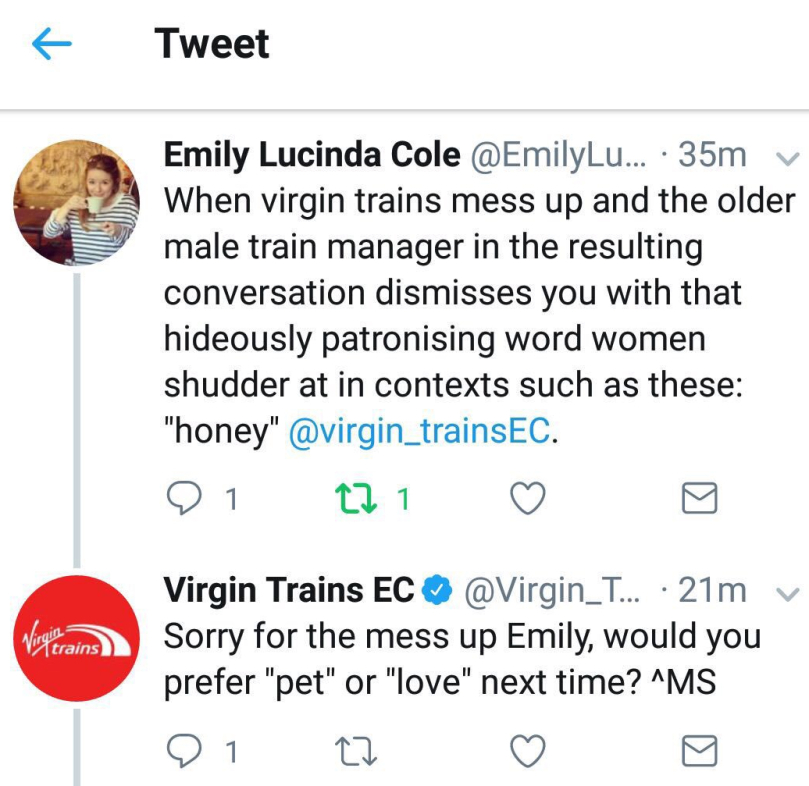27-year-old Emily Lucinda Cole attempted to make a complaint about a bad experience on Virgin Trains. She was not only silenced with a sexist response from a male member of staff, but upon trying to raise this very serious issue with Virgin Trains she was the recipient of yet more sexist comments.

It seems that many people choosing to comment to Ms Cole (and others involved) appear to be struggling to understand why this is sexist, so I would like to explore it in this post.
The silencing effectThat women are used to being silenced by men is undeniable. Though there are some women who may feel that they have never experienced being silenced, or perhaps have grown so accustomed to it that they do not notice it, this minority is vastly outweighed by the majority of women who have, at some point in their lives, been silenced by a man.
Silencing can occur in numerous ways, and just a few examples include; intimidation (think booming voices and aggressive body language); blatant disregard for female opinion (men know better, didn’t you know? Even about things only a woman can experience!); accusation (“Another feminazi!”, “Over sensitive!”, “You’re bullying men simply for being men!”); and humiliation (making a woman feel less intelligent, laughing at women standing up for their passions, public shaming).
I feel that the silencing techniques used by Virgin Trains employees in this circumstance come under the humiliation section, with a bit of intimidation thrown in for good measure. A woman has a legitimate complaint which she attempts to discuss with an “abrasive” male member of staff, “politely and honestly”. When she mentions that she intends on complaining, he responds with “you go ahead honey”. In Ms Cole’s words:
“In the context and given his aggressive tone I can only assume he didn’t like being challenged by a woman.
“I wouldn’t have complained if he’d used the term in a familial or affectionate way. It definitely wasn’t that.”
If we dissect her well described tweet, it isn’t hard to see that this woman could very easily have been verbally shot down by this man. He used a term that is typically used in reference to women, in a way that was perceived by the woman as aggressive. Though there is some question of regional address (eg being called ‘Duck’ in Yorkshire), the original tweet, and a following statement, makes it clear that the woman did not feel this was the case. A fellow passenger, Mr Cannon, specifically addressed it, too:
He was male. I heard him. And it wasn’t regionally appropriate. She was (legitimately) complaining about something else and his response was highly patronising.
— Joe Cannon #FBPE (@JoeCannonLondon) January 2, 2018
It really isn’t that hard to believe that the comment could have easily been perceived as a jibe, which could well serve as a reminder of Ms Cole’s gender, and thus, her place. However, those who do still find that hard to believe must understand that these sort of comments, be them careless or misogynistic, have a silencing impact.
The horrific response from Virgin trains of: “Sorry for the mess up Emily. Would you prefer “pet” or “love” next time?” served as further humiliation for a woman who was simply attempting to make a complaint about a service, and then had to make a complaint about the member of staff she was trying to complain to. Further sexism was thrown at her, in a further attempt to silence her, on a public platform.
“Women should not allow themselves to be referred to as anything other than who they are in a professional setting.” Nicola RobertsThe language used when communicating with women is something that must be taken seriously by all, but particularly in a professional setting. A 2016 poll of more than 2000 women found that 40% felt “patronised” after being called pet names in the workplace. Though Ms Cole was not at work, she was communicating with Virgin Trains employees in their workplace.
The poll explored a number of words that women found patronising, and though ‘honey’ didn’t make it onto this particular list, similar terms (such as ‘princess’, ‘bird’, ‘doll’ and ‘chick’) did. Knowing the context of this situation – which Ms Cole’s concise tweet summed up excellently, and with the added bonus of confirmation from her fellow passenger – the effect of the term honey, in this circumstance, is akin to the effect of the words listed. Couple that with an aggressive or snarky attitude and it’s hard to see how anyone can deny it was sexist. Yet many are not only denying it, but also openly attacking both Ms Cole and Mr Cannon for speaking out.
Perhaps it is the response of the public that is even more disgusting. Suddenly, there are hundreds of people trying to silence Ms Cole, and anybody who appears to be supportive of her.
“OMG get a grip! Seriously offended by being called ‘Honey’ and actually took the time to tweet it? You didn’t like it, Ok, so what, move on! There are far worse words you could have been called snowflake” – Didn’t 2017 teach us that we should never just shut up about sexual discrimination? Pretending it doesn’t exist is dangerous, so calling it out is essential.
“Tbh I can understand where they’re coming from. I don’t think they meant it maliciously. They’ll have been trying to come across friendly/a bit more sincere to diffuse a situation. You also forget older generations use different words to us. It’s normal to them.” – The author of this tweet was male. He is possibly going for 2018’s ‘Best Mansplainer’ award.
“And in other news, I was asked ‘can I get you a drink hun’ by one of the female staff a few weeks ago. What did I do? That’s right, absolutely nothing.” – This tweet completely ignores the fact that the situation Ms Cole was in was nothing like this.
“As an asexual fruitarian vampire who identifies as a Pritt Stick, I am deeply offended by this.” – Because only the hypersensitive speak out about sexism, right?
Egg and cress sandwich on brown gluten free bread, The guardian, Innocent Smoothie, Bicycle with Bell, Avid reader of Times Best Sellers list, Woolly jumpers, Higher education graduate, CND, up the revolution (from my marketing desk) #1stworldproblems #imoffendedbyeverything – Addressed to both Ms Cole and Mr Cannon, this is offensive in multiple ways and another attempt to ‘shame’ them into silence.
It’s so disheartening to see that so many people have totally missed the point. Especially when they were responding to tweets that lay out the point so clearly.
Virgin Trains deleted the tweet and issued the following apology:
We apologise unreservedly for this tweet and any offence that it may have caused. To avoid causing more offence we have deleted the original post.
— Virgin Trains EC (@Virgin_TrainsEC) January 2, 2018
However, even though Virgin Trains apologised ‘unreservedly’, accepting there was something very wrong with the way they acted, it still didn’t stop the attacks rolling in from the public. They are still ongoing today.
So, it’s quite obvious that the damage is already done. People continue to attempt to shame Ms Cole for complaining by crying ‘First world problems!’, but misogyny is a very serious problem whatever part of the world we’re in. It’s the silencing of women and acceptance of casual sexism in everyday situations that leads to more dangerous acts.
Though it may seem to some like a drop of water in the sea of oppression, this sort of public attack on a woman simply making a complaint will have very negative consequences for women in the future. The message that has been given is that if a male worker responds in an aggressive and patronising manner, you’d better keep quiet else you’ll end up being publicly shamed. Where is the line drawn on what we ‘should’ keep quiet about?
Share this:





